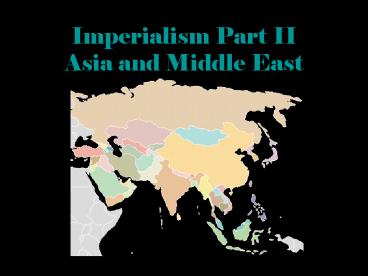Imperialism Part II Asia and Middle East
1 / 12
Title:
Imperialism Part II Asia and Middle East
Description:
Imperialism Part II Asia and Middle East India Was controlled by Great Britain 1839-1947 Britain was insensitive to Hindu and Muslim Religion and Indian Customs ... –
Number of Views:94
Avg rating:3.0/5.0
Title: Imperialism Part II Asia and Middle East
1
Imperialism Part IIAsia and Middle East
2
India
- Was controlled by Great Britain 1839-1947
- Britain was insensitive to Hindu and Muslim
Religion and Indian Customs - Britain created a modern system of secondary
education, economic reforms, and a unified
powerful state
3
Leading to Rebellion
- Caused by British insensitivity
- Soldiers were forced to bite bullets coated in
animal fat from cows or pigs ? violated dietary
restrictions and religious beliefs - Raised taxes, less pay, food shortages
- Widows were allowed to remarry (Sati)? seen as
Christian conspiracy to undermine beliefs
4
Sepoy Rebellion 1857-1858
- Hindu and Muslim Soldiers
- Northern and central India
- Crushed by British loyal troops in south
- After India is ruled by Parliament in London and
administered by a tiny all white committee in
India
5
China
- Carved into spheres of influence in the late 19th
century - Had a trade surplus up until the Industrial
Revolution - Tea Opium Trade with Britain leads to conflict
- Eventually they are controlled by Britain,
France, Germany, Russia and Japan - US Open Door Policy
6
Opium Wars
- 1839-1841 Chinese government outlawed opium due
to addiction - British merchant ships clashed with Chinese
warships - Chinese were easily defeated by Britains more
advanced gun boats - Treaty of Nanking pay indemnity, Britain gets
Hong Kong and have to open 5 ports to foreign
trade - 1856-1860 China is forced to accept trade and
investment terms of the west - Westerners followed their home laws not Chinas
7
Taiping Rebellion 1850
- Led by Hong Xiuquan (Christian)
- Wanted land reform, community ownership of
property, equality for men and women - Civil War for 14 years ? 20 million died
- Manchus defeated rebellion with British help
8
Boxer Rebellion 1899
- Response to Open Door Policy and Imperialism
- Antiforeigner feelings ? anti-imperialism
- Trained in martial arts
- Attacked foreigners nationwide in 1900
- Western Powers Japan join forces and crush
rebellion - Chinese nationalism continued to spread
9
Dr. Sun Yixian
- Wanted to overthrow the Qing Dynasty and create a
republic - Created 3 principles of the People
- 1 Nationalism
- 2 Democracy
- 3 Livelihood
- Dec 1911 named new president of the Chinese
republic ? next 37 years saw constant war with
itself or foreign invaders
10
Japan
- Japan resisted being imperialized
- Was quick to modernize and became an imperial
power in late 19th century - Meiji Restoration reforms to compete with the
West
11
Russo - Japanese War 1904
- Russia and Japan both want Manchuria and Korea
- Russia want a trans-Siberian
- railway across Manchuria
- Japan destroys
- Russias fleet off Korea
- Impact Russia turns to take over Balkans, Japan
Annexes Korea, West is afraid of Japan -1st
powerful Asian nation
12
Asia Division
- France Indochina
- Britain Burma, Malay Peninsula, North Borneo
- Germany Some Pacific Islands
- Russia Persia, outer China
- Spanish - American War US took Philippines,
Guam, Cuba Hawaii - Britain and Russia Iran (Oil!)

